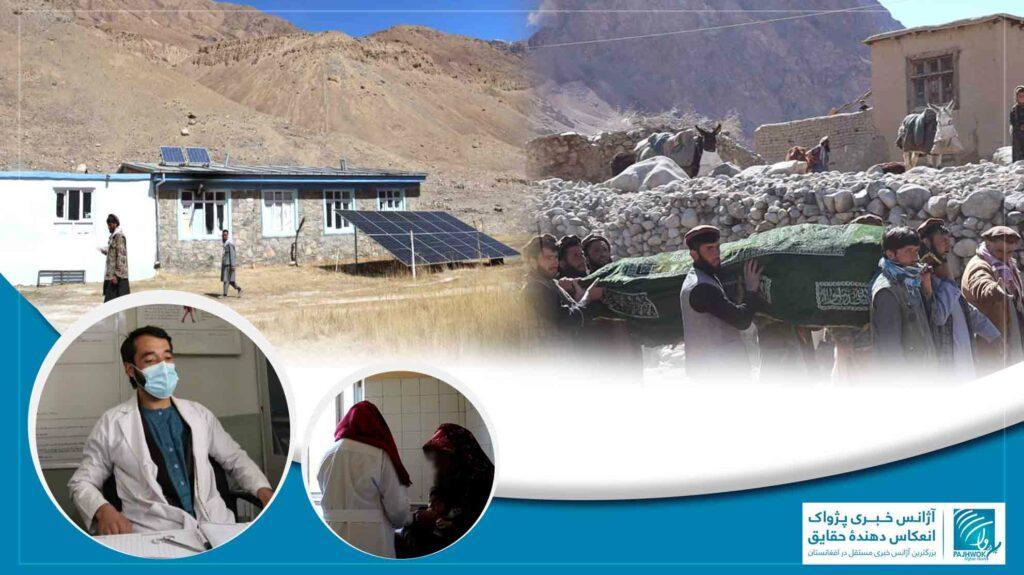
Childbirth Carries Deadly Risk For Women In Badakhshan
FAIZABAD (Pajhwok): For women in the remote district of Kiran wa Minjan in northeastern Badakhshan province, childbirth often carries a deadly risk.
Inadequate medical facilities, a lack of trained doctors, and impassable roads have led to countless preventable deaths. For many, giving birth means gambling with life.
One such tragedy is that of Abdullah, a 35-year-old man from Kiran wa Minjan, who has yet to come to terms with the loss of his wife. His hands tremble, a lump forms in his throat, and his voice cracks with emotion as he speaks:“If there had been a doctor and medicine, if there had been a hospital in our district, she would have been still alive, and my child would have been born.”
Abdullah's wife died while being transported to Faizabad, the provincial capital, after enduring three days of excruciating labor. Initially, she was taken to the local clinic in Kiran wa Minjan, but due to the lack of medical equipment and trained staff, she was referred to Faizabad. Tragically, she did not make it to her destination and passed away in Ab Jukhan area of Yamgan district.
Reflecting on the heart-wrenching experience, Abdullah says,“It had been a year since our marriage, and it was my wife's first pregnancy. She endured three days of pain. We took her to the clinic in Kiran wa Minjan, but nothing could be done. When we tried to transfer her to the hospital in Faizabad, she died on the way. If there had been a proper hospital with trained doctors here, my wife and child would still be with me.”
Lack of life-saving resources
Abdullah's brother-in-law, Abdul Rauf, speaking at his sister's funeral, described the situation with sorrow.“My sister suffered three days of pains because there were no trained doctors. Despite our best efforts, we couldn't get her to a hospital in Baharak or Faizabad. She passed away on the way to Faizabad. We brought her lifeless body back to the village of Askaspeek.”
Abdul Rauf emphasized the lack of medical facilities, long travel distances, and poor road conditions as the primary factors in his sister's death.
He urgently called on the Islamic Emirate of Afghanistan (IEA) to build a modern hospital in Kiran wa Minjan to prevent further tragedies.
Mahsa, a mother of three from Badakhshan, shared the struggles women in the province face during childbirth.
“Many women in remote districts cannot get to a hospital or health center in time. As a result, some mothers either lose their lives or their babies.” She highlighted the lack of skilled midwives and proper transportation as critical issues.
“Building equipped hospitals and clinics with trained midwives and specialist doctors in each district would significantly reduce maternal mortality rate. Currently, only a few districts have well-equipped clinics. In remote areas, there are no health services or the ones available do not meet people's needs,” Mahsa said.
She warned that unless these issues are addressed, women in rural areas will continue to suffer, with more mothers' lives lost, particularly during childbirth.
In the previous solar year (1403), 29 women in Kiran wa Minjan died from complications related to childbirth before reaching a health facility.
Bakhsh Mohammad, head of the primary health center in Askazar, the district center, confirmed that health-related problems had exacerbated by the district's remote location.
“We do not have surgical or operational facilities here,” he explained.“Patients who need to be referred often die from complications like excessive bleeding during the journey to Baharak or Faizabad.”
He stressed the need for a Comprehensive Health Center (CHC) to provide advanced care on-site, without the need for dangerous and time-consuming travel.
Bakhsh Mohammad further revealed that, while three people died at the Askazar health center in 1403, 29 others lost their lives on their way to Faizabad or Baharak. He called for the urgent establishment of a CHC in the district to reduce these deaths.
Inaccessible health care
Residents of villages in Kiran wa Minjan, like Amarullah from Yamak Bala, also voiced their frustration with the lack of medical facilities.“In our area, we are more than four hours' walking distance from the nearest health center, and there are no advanced clinics or qualified doctors nearby. We always lose our patients on the way to other hospitals.”
The long distance to the provincial capital, combined with poor roads and harsh winter conditions, make it extremely difficult to transfer patients in time for critical care.“We need a modern health center here. If we don't get one, we will continue to lose our loved ones,” Amarullah added.
Sayed Akbar, who lost his young son a month ago due to the lack of medical facilities, echoed these concerns.“In the entire district, there is only one ambulance. Even for simple illnesses, there is not enough equipment. A month ago, my son fell ill, and despite trying to transfer him to Faizabad, he passed away on the way.”
The clinic in Kiran wa Minjan has severe shortages.“They may have medicine for three months, but when it runs out, there is no guarantee when it will be available again,” Sayed Akbar lamented. He called for more doctors and specialists in the district.
Officials' promises
Bakhsh Mohammad, the representative of Skaspak village, added to the growing call for better medical infrastructure.“Our patients must travel 10 to 11 hours to reach Faizabad. Many pregnant women die during this journey because of bleeding or severe pain. Some families can't afford the high costs of transferring patients to Faizabad or Panjshir. The government and international organizations must address the lack of health services in our district.”
Qari Atiqullah Faizi, the head of Badakhshan's public health department, acknowledged the district's health challenges but did not confirm the maternal mortality figures.
He said that upgrading the existing primary health center (BHC) to a CHC had been approved but had yet to be implemented due to budget constraints.
Faizi also revealed that the Ministry of Public Health plans to build 318 district general hospitals across Afghanistan this year. If Badakhshan receives 27 new hospitals, one will be constructed in Kiran wa Minjan. If fewer hospitals are allocated to the province, one will either be built in Kiran wa Minjan or Yamgan, along with necessary buildings and services to improve healthcare in the region.
Currently, 10 districts in Badakhshan have primary health centers, and three have district-level health facilities. However, only a few districts have fully functioning comprehensive health centers (CHC).
sa/ma

Legal Disclaimer:
MENAFN provides the
information “as is” without warranty of any kind. We do not accept
any responsibility or liability for the accuracy, content, images,
videos, licenses, completeness, legality, or reliability of the information
contained in this article. If you have any complaints or copyright
issues related to this article, kindly contact the provider above.






















Comments
No comment